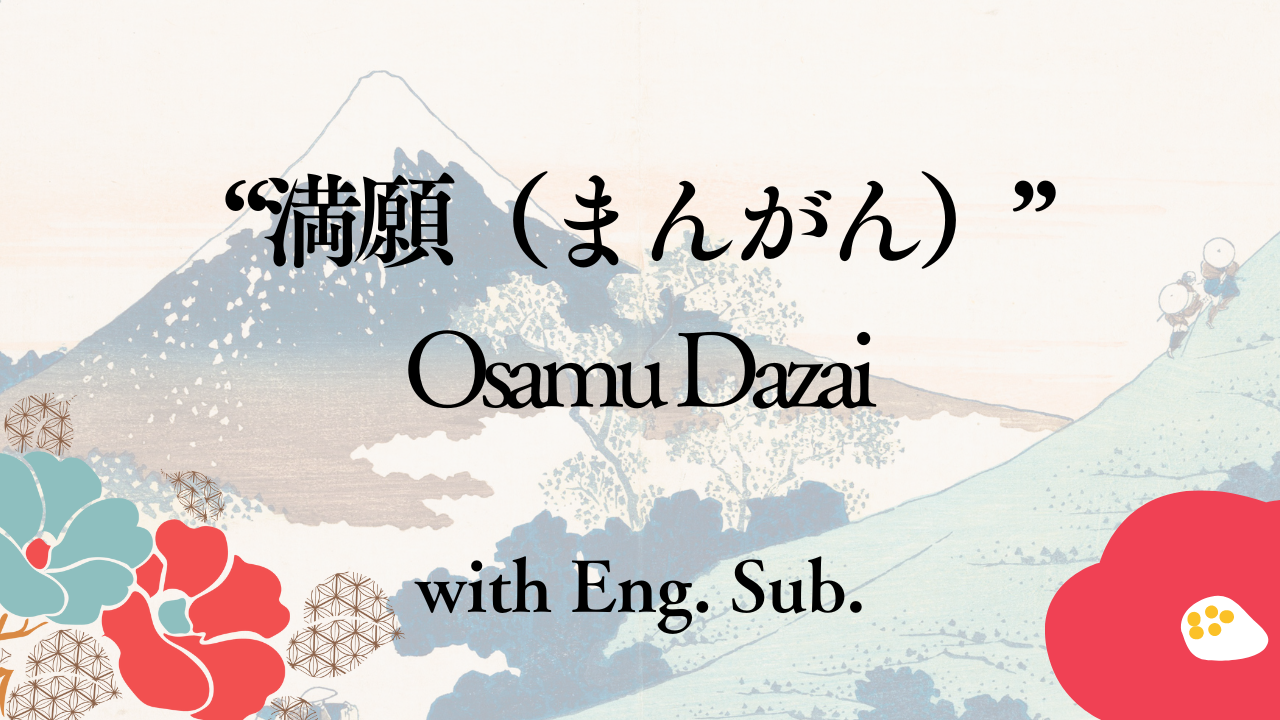About Osamu Dazai
Osamu Dazai was a highly influential Japanese author whose literary contributions remain significant in the realms of modern Japanese literature. Born in 1909, Dazai gained widespread acclaim for his compelling exploration of the human psyche and emotional landscapes in his works.
His narratives often delved into the inner turmoil of characters, capturing themes of existential angst, alienation, and the complexities of human relationships. Dazai’s most famous work, “No Longer Human” (“Ningen Shikkaku”), is a semi-autobiographical novel that deeply examines the struggles of the protagonist with a sense of detachment from society, battling a profound sense of isolation and inadequacy.
Another notable work, “The Setting Sun” (“Shayo”), portrays the disintegration of traditional Japanese values in the aftermath of World War II, showcasing the struggles of a declining aristocratic family in a changing society.
Dazai’s writing style is revered for its eloquence, introspection, and profound philosophical underpinnings. His ability to intertwine personal struggles with broader societal issues has earned him a lasting legacy as one of Japan’s most celebrated literary figures. Tragically, Dazai’s own life ended prematurely in 1948, but his works continue to resonate with readers worldwide, offering poignant reflections on the human condition.
日本語(Japanese)
これは、いまから、四年まえの話である。私が伊豆の三島の知り合いのうちの二階で一夏を暮し、ロマネスクという小説を書いていたころの話である。ある夜、酔いながら自転車に乗りまちを走って、怪我をした。右足のくるぶしの上のほうを裂いた。疵は深いものではなかったが、それでも酒をのんでいたために、出血がたいへんで、あわててお医者に駈けつけた。まち医者は三十二歳の、大きくふとり、西郷隆盛に似ていた。たいへん酔っていた。私と同じくらいにふらふら酔って診察室に現われたので、私は、おかしかった。治療を受けながら、私がくすくす笑ってしまった。するとお医者もくすくす笑い出し、とうとうたまりかねて、ふたり声を合せて大笑いした。
その夜から私たちは仲良くなった。お医者は、文学よりも哲学を好んだ。私もそのほうを語るのが、気が楽で、話がはずんだ。お医者の世界観は、原始二元論ともいうべきもので、世の中の有様をすべて善玉悪玉の合戦と見て、なかなか歯切れがよかった。私は愛という単一神を信じたく内心つとめていたのであるが、それでもお医者の善玉悪玉の説を聞くと、うっとうしい胸のうちが、一味爽涼を覚えるのだ。たとえば、宵の私の訪問をもてなすのに、ただちに奥さんにビールを命ずるお医者自身は善玉であり、今宵はビールでなくブリッジ(トランプ遊戯の一種)いたしましょう、と笑いながら提議する奥さんこそは悪玉である、というお医者の例証には、私も素直に賛成した。奥さんは、小がらの、おたふくがおであったが、色が白く上品であった。子供はなかったが、奥さんの弟で沼津の商業学校にかよっているおとなしい少年がひとり、二階にいた。
お医者の家では、五種類の新聞をとっていたので、私はそれを読ませてもらいにほとんど毎朝、散歩の途中に立ち寄って、三十分か一時間お邪魔した。裏口からまわって、座敷の縁側に腰をかけ、奥さんの持って来る冷い麦茶を飲みながら、風に吹かれてぱらぱら騒ぐ新聞を片手でしっかり押えつけて読むのであるが、縁側から二間と離れていない、青草原のあいだを水量たっぷりの小川がゆるゆる流れていて、その小川に沿った細い道を自転車で通る牛乳配達の青年が、毎朝きまって、おはようございます、と旅の私に挨拶した。その時刻に、薬をとりに来る若い女のひとがあった。簡単服に下駄をはき、清潔な感じのひとで、よくお医者と診察室で笑い合っていて、ときたまお医者が、玄関までそのひとを見送り、
「奥さま、もうすこしのご辛棒ですよ。」と大声で叱咤することがある。
お医者の奥さんが、或るとき私に、そのわけを語って聞かせた。小学校の先生の奥さまで、先生は、三年まえに肺をわるくし、このごろずんずんよくなった。お医者は一所懸命で、その若い奥さまに、いまがだいじのところと、固く禁じた。奥さまは言いつけを守った。それでも、ときどき、なんだか、ふびんに伺うことがある。お医者は、その都度、心を鬼にして、奥さまもうすこしのご辛棒ですよ、と言外に意味をふくめて叱咤するのだそうである。
八月のおわり、私は美しいものを見た。朝、お医者の家の縁側で新聞を読んでいると、私の傍に横坐りに坐っていた奥さんが、
「ああ、うれしそうね。」と小声でそっと囁いた。
ふと顔をあげると、すぐ眼のまえの小道を、簡単服を着た清潔な姿が、さっさっと飛ぶようにして歩いていった。白いパラソルをくるくるっとまわした。
「けさ、おゆるしが出たのよ。」奥さんは、また、囁く。
三年、と一口にいっても、――胸が一ぱいになった。年つき経つほど、私には、あの女性の姿が美しく思われる。あれは、お医者の奥さんのさしがねかも知れない。
英語(English translation)
This is a story from four years ago. It was during the summer when I lived on the second floor of an acquaintance’s house in Mishima, Izu, and was writing a novel called ‘Romanesque.’ One night, while intoxicated, I rode my bicycle around town and got injured. I tore the upper part of my right ankle. It wasn’t a deep wound, but due to being intoxicated, the bleeding was severe, so I hurried to see a doctor. The town doctor was thirty-two years old, large and stout, resembling Saigo Takamori. He was quite drunk. He appeared in the examination room as unsteady on his feet as I was, which struck me as amusing. While receiving treatment, I couldn’t help but chuckle. Then the doctor also started chuckling, and eventually, unable to contain ourselves, we burst into laughter together.
We became good friends from that night onward. The doctor preferred philosophy over literature. Speaking about that topic made conversation easy and enjoyable for me. His worldview could be described as a kind of primal dualism, viewing the state of the world as a battle between good and evil forces, which was quite captivating. Although I secretly endeavored to believe in a singular god of love, hearing the doctor’s theory of good and evil would bring a refreshing sensation to my somewhat troubled heart.
For instance, when I visited one evening, the doctor, who immediately ordered his wife to fetch beer to entertain me, was considered the ‘good’ force, while his wife, proposing with a laugh, ‘Tonight, instead of beer, shall we play bridge?’ was considered the ‘bad’ force in the doctor’s illustration. I found myself in agreement with the doctor’s argument. His wife was petite, with a round face, and she carried an elegant demeanor with fair skin. They had no children, but there was a quiet young man, the wife’s younger brother attending a commercial school in Numazu, who stayed on the second floor.
At the doctor’s house, they subscribed to five different newspapers, so nearly every morning, I would stop by during my walk to read them. Going around to the back entrance, I’d sit on the veranda, sipping the cold barley tea brought by the wife, while holding down the rustling newspapers against the wind to read. The veranda was just a stone’s throw away from a grassy field, where a stream flowed gently. Every morning, a young milk delivery man on a bicycle would pass by along the narrow road alongside that stream, greeting me with a “Good morning.” There was also a young woman who came around that time to pick up medicine. She wore simple clothes and wooden clogs, appearing quite neat. She often shared laughs with the doctor in the examination room, and sometimes the doctor would loudly scold her at the door, saying, “Madam, please wait a little longer.
The doctor’s wife once explained to me the reason behind this. She was the wife of an elementary school teacher. The teacher had suffered from lung problems three years prior, but recently, he had been steadily improving. The doctor worked tirelessly and strictly forbade his young wife about the critical nature of his current condition. The wife obeyed this directive. However, sometimes, she seemed somewhat anxious. Each time this happened, the doctor steeled himself and would scold her, saying something along the lines of, “Madam, please wait a little longer,” implying a deeper meaning.
At the end of August, I witnessed something beautiful. In the morning, as I sat on the veranda of the doctor’s house reading a newspaper, the doctor’s wife, sitting beside me, softly whispered, “Ah, how joyful she seems.”
Suddenly, I raised my head and saw a figure in simple attire, walking briskly along the path right in front of us. She twirled a white parasol as she walked swiftly.
“This morning, she was given a permission to go out as usual,” the doctor’s wife whispered again.
Three years—it’s just a brief phrase, yet my heart was overwhelmed. With passing years, that woman’s figure seemed increasingly beautiful to me. Perhaps, it might be due to the doctor’s wife’s understanding.
朗読(Recitation)
まとめ
Thank you for visiting the website. I look forward to seeing you again.



Comment